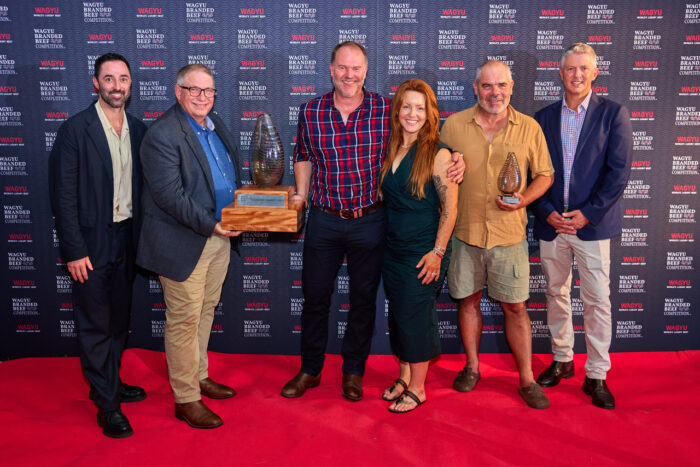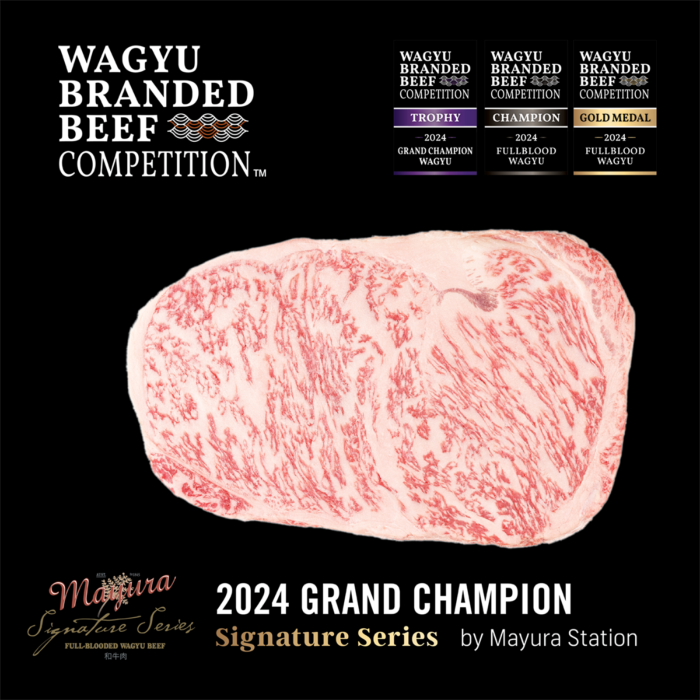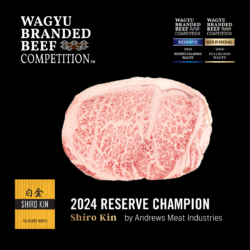
Mayura Station accept their Grand Champion accolades. L-R Andy Allen (WBBC Awards MC and Three Blue Ducks), Terry Donohue (Ariat Australia), Scott and Kristy de Bruin (Mayura Station), Mark Oliver (Mayura Station) and Dr Matt McDonagh (AWA CEO).
Last night, South Australia’s Mayura Station became the first Australian Wagyu producer to take out Grand Champion three times at the Wagyu Branded Beef Competition (WBBC) with a Class 1 Fullblood Wagyu entry of their Signature Series steaks. The 13th annual awards, hosted by the Australian Wagyu Association (AWA) at their annual WagyuEdge conference, is currently running until 12 April in Queensland’s sunny Cairns.
Having previously won Grand Champion twice with their entries in the 2019 and 2022 WBBCs, Mayura Station, based on SA’s Limestone Coast, has rightly cemented their place in the annals of Australian Wagyu fame. Their wonderous Signature Series steak entry scored 1128 points, with the judges remarking it had an “exceptional melt in your mouth juiciness, with lasting umami flavours and a satisfying silky mouthfeel.” Bred by Mayura themselves, this entry contained 60% marbling with a marbling fineness score of 8 and an astonishing eye muscle area of 154cm2, which blew the competition out of the water.
This year the WBBC saw a total of 66 world class entries, up almost 14%YOY, were judged by 36 renowned food and beef industry experts from around Australia. Five classes were awarded on the night:
- Class 1: Fullblood Wagyu
- Class 2: Purebred Wagyu
- Class 3: Open Crossbred
- Class 4: Open F1 Wagyu
- Class 5: Commercial Wagyu Marble Score 5-7

Entries are scored for their visual appeal when raw and cooked, juiciness, flavour, aroma and physical mouth sensation. The WBBC is designed to promote the excellence and advancement of Australian Wagyu beef, which is naturally nutritious and of exceptional quality, on a national and international stage.
Mayura Station’s, Scott de Bruin, said of their historic win: “We are very proud to have achieved the unprecedented title of winning this award three times, amongst such prestigious competition. Once thing that excites me is our ability to have been able to stay consistent over the years of the competition. I am very proud of the entire team at Mayura Station, for their shared passion to produce the highest quality wagyu beef in the country.”
Mayura Station stands as a paragon of excellence in the world of Wagyu, renowned for curating animals which produce unmatched marbling and exquisite flavour profiles. With a heritage rooted in meticulous breeding and ethical practices, Mayura Station redefines the Wagyu experience, delivering a culinary journey that captivates the senses.
Reserve Champion was awarded to Andrews Meat Industries’ Shiro Kin steak on the night, also from the Class 1 category of Fullblood Wagyu, which scored 1120.8 points and was described by judges as creating a “Melting, creamy caramel mouthfeel with rich and beefy aromas”. Bred by 3D Genetics, this entry contained the highest marbling percentage of all entries at 71%, with a marbling fineness score of 8.7 and marbling score of 9+, with an eye muscle area of 105cm2.
 Shiro Kin steaks are sourced from the fertile Darling Downs in Queensland and fed on a specially designed Japanese diet for at least 500 days. Shiro cattle are direct descendants of Japanese Wagyu with no outside influences from other breeds, produced from Tajima Sires with a focus on Japanese Dam lines of Kedaka and Shimane.
Shiro Kin steaks are sourced from the fertile Darling Downs in Queensland and fed on a specially designed Japanese diet for at least 500 days. Shiro cattle are direct descendants of Japanese Wagyu with no outside influences from other breeds, produced from Tajima Sires with a focus on Japanese Dam lines of Kedaka and Shimane.
Andrews Meat Industries, Jeremy Stuart, said: “The hard work and dedication of our Shiro Kin team members over the past dozen years are directly responsible for us taking home this award. We will be busy celebrating for the rest of the conference, then it’s back to work improving our efforts even further ahead of next year’s awards.”
Class 2, Purebred Wagyu Steak Champion was awarded to Starzen Australia for their Eight Blossom Beef with 1192.8 points, described as having “exceptional citrus and rich umami mushroom tones, with a smooth, melt in your mouth aftertaste.” Bred by Fuchang Woodlands, this entry contained 62% marbling with a fineness of 7.3 and a marbling score of 9+, and an eye muscle area of 143cm2.
Starzen Australia is a Japanese/Australian venture, utilising Southeast Queensland’s mild climate with plenty of sun and shade and a specially formulated 350 day diet to produce a steak with high marbling scores of 6.5 and above.
Class 3’s Open Crossbred Steak Champion went to Stone Axe Pastoral Company’s Margaret River Wagyu, receiving 1101.6 points and being described by judges as a “luxury, delicate high-level example of Wagyu beef with silky, velvety, creamy tones and mouthfeel.” Bred by Stone Axe Pastoral Company, this entry contained 60.7% marbling, a marbling fineness of 7.1, marbling score of 9+ and an eye muscle area of 110cm2.
Stone Axe Pastoral Company supplies to the ultra-premium Wagyu market globally through their state-of-the-art, large scale, vertically integrated feedlots and facilities. Their Margaret River Wagyu is raised sustainably across eleven farms around the Margaret River region in South West Western Australia, famed for its rich, fertile soils and reliable rainfalls.
Class 4 Champion for Open F1 Wagyu Steak went to Tamworth’s Jack’s Creek F1 Wagyu, which judges described as being “the complete Wagyu package, with delightfully outstanding tender and lasting buttery juiciness with caramel undertones”, awarding 1073.6 points. Bred by Stamo, this entry contained 55% marbling with a marbling fineness of 8.6 and marbling score of 9+, and an eye muscle area of 118cm2.
Jack’s Creek was one of the first Australian companies to breed, grow, feed, process and market Wagyu domestically and now exports to over 20 countries worldwide while still maintaining a substantial presence in the domestic market.
Class 5 Champion rounded out the evening, going to ICON XB Wagyu by Paradigm Foods with 938.4 points and being described by judges as “very rich and soft on the palate” and “rich, but delicate”. Bred by Hugh McMurtrie, this entry contained 37.5% marbling, marbling fineness of 5.9 with a marbling score of 9 and an eye muscle area of 111cm2.
Paradigm Foods is headquartered in Brisbane and is the newest brand to earn Champion in this year’s WBBC, starting out in 2018. Paradigm is the first Australian meat producer and exporter to be labelled a Certified B Corporation, recognising their dedication to high social and environmental performance, accountability to stakeholders and transparency to the public.
Class 1: Fullblood Japanese Black Steak
- Grand Champion: Signature Series || Mayura Station
- Reserve Champion: Shiro Kin || Andrews Meat Industries
- Gold Medallists
- Signature Series || Mayura Station
- Shiro Kin || Andrews Meat Industries
- L’grow || Lotte International
- Master Selection || Mort & Co
- Sanchoku Wagyu || Stanbroke
- Stone Axe Wagyu || Stone Axe Pastoral Company
- Macquarie Wagyu || Direct Meat Company Pty Ltd
- Jade Wagyu || Kilcoy Global Foods
- Silver Medallists
- Connors Wagyu Beef || Direct Meat Company Pty Ltd
- King River Fullblood || KING RIVER
- Cobungra Station Wagyu || Stone Axe Pastoral Company
- Jack’s Creek Wagyu || JACK’S CREEK
- Infinite Full Blood Wagyu || Rangers Valley Cattle Station
Class 2: Purebred Wagyu Steak
- Champion: Eight Blossom Beef || Starzen Australia Pty Ltd
- Gold Medallists
- Eight Blossom Beef || Starzen Australia Pty Ltd
- Kiwami by Stockyard || Stockyard Beef Pty Ltd
- Silver Medallists
- Poll Wagyu || Poll Wagyu
- Okan || Pardoo Wagyu
- Jack’s Creek Wagyu || JACK’S CREEK
Class 3: Open Crossbred Steak
- Champion: Margaret River Wagyu Beef || Stone Axe Pastoral Company
- Gold Medallists
- Margaret River Wagyu Beef || Stone Axe Pastoral Company
- ICON XB Wagyu || Paradigm Foods
- Carrara Wagyu || Kilcoy Global Foods
- Okan || Pardoo Wagyu
- Sanchoku Wagyu || Stanbroke
- Silver Medallists
- Jack’s Creek Wagyu X || JACK’S CREEK
- Darling Downs || Australian Agricultural Company
- Cloverlea Wagyu || Cloverlea Enterprises Pty Ltd
Class 4: Open F1 Wagyu Steak
- Champion: Jack’s Creek Wagyu F1 || JACK’S CREEK
- Gold Medallists
- Jack’s Creek Wagyu F1 || JACK’S CREEK
- Black Opal || Harmony Agriculture & Food Co
- Silver Medallists
- ICON XB Wagyu || Paradigm Foods
- Kuro Kin Wagyu F1 || Pinnacle Fine Foods
- Cloverlea Wagyu || Cloverlea Enterprises Pty Ltd
- Tajima Australian Grainfed Wagyu || Andrews Meat Industries
- King River Crossbred || KING RIVER
Class 5: Commercial Wagyu Steak Marble Score 5-7
- Champion: ICON XB Wagyu || Paradigm Foods
- Gold Medallists
- ICON XB Wagyu || Paradigm Foods
- Tajima Australian Grainfed Wagyu || Andrews Meat Industries
- L’grow || Lotte International
- First Growth || Pardoo Wagyu
- Silver Medallists
- King River Crossbred || KING RIVER
- Jack’s Creek Wagyu X || JACK’S CREEK
- Darling Downs || Australian Agricultural Company
- Kuro Kin Wagyu F1 || Pinnacle Fine Foods
- Imperial Blossom Beef || Starzen Australia Pty Ltd
The Australian Wagyu Association was founded in 1989 and now counts more than 1,000 members among its ranks across 30 different countries. Their vision for the future is to support and promote the Wagyu sector and advancing production to benefit the entire Wagyu community. The International WagyuEdge Conference was created in YEAR to facilitate connections and knowledge exchange amongst industry experts and AWA members, provide captivating seminars and to advance the domestic and global Wagyu industry.
